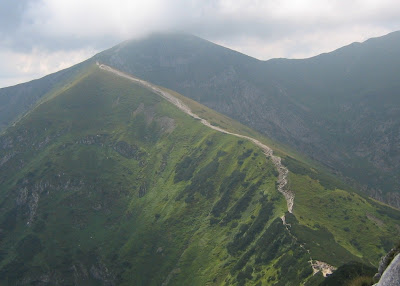In August of 2004, I hiked to the summit of Mount Giewont in the Tatras and took this picture, breathless, knowing I would return one day and walk this very path. Time passes, breath returns, and while I haven’t, the foreknowledge of my return remains certain. However, the knowledge of Polish verbs of motion that might get me there has yet to arrive. How would one even say that, in this context, in Polish? How does knowledge arrive? On foot typically, przyjść? (Close readers will note that I have discovered the symbol browser under the insert menu, where all Polish consonants have lain in patient wait for my discovering them.) By vehicle, przyjechać? Or on wing, przylecieć. Definitely on wing, I think, but is that arrival a one-time only completed action, or is it not rather a habitual or random motion, or a characteristic action requiring przylatać? If completed, wouldn’t it be the perfective, poprzylecieć? You can begin to see the conceptual problems in the Polish mind, complex and subtle, even if you can’t pronounce them, and those problems now beset me, and I have sat under in-class questioning in a blankness altogether embarrassingly complete. Professor Polakiewicz assures us, not without mischief in his voice, that the knowledge of verbs of motion will come—in twenty-five years. Maybe fifteen.
What sustains a pilgrim over the long blank hours is his vision.

